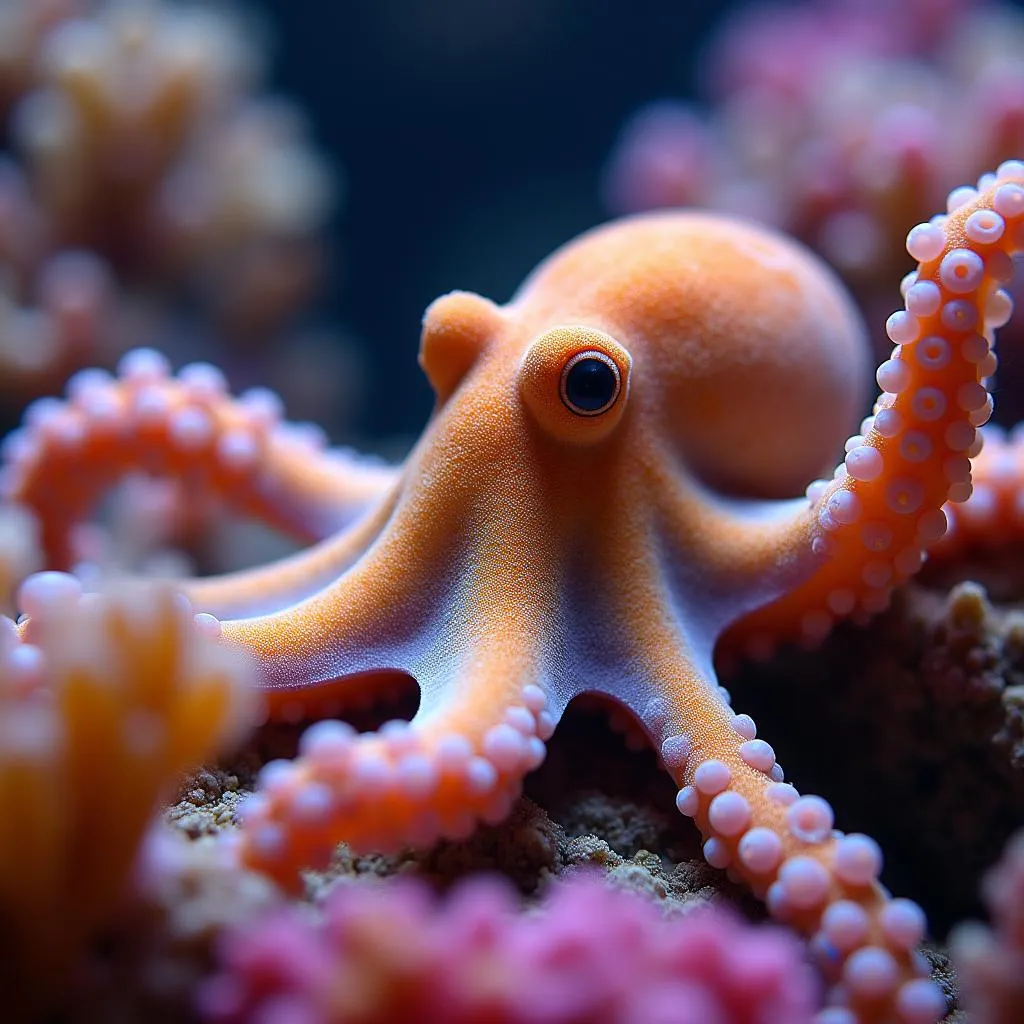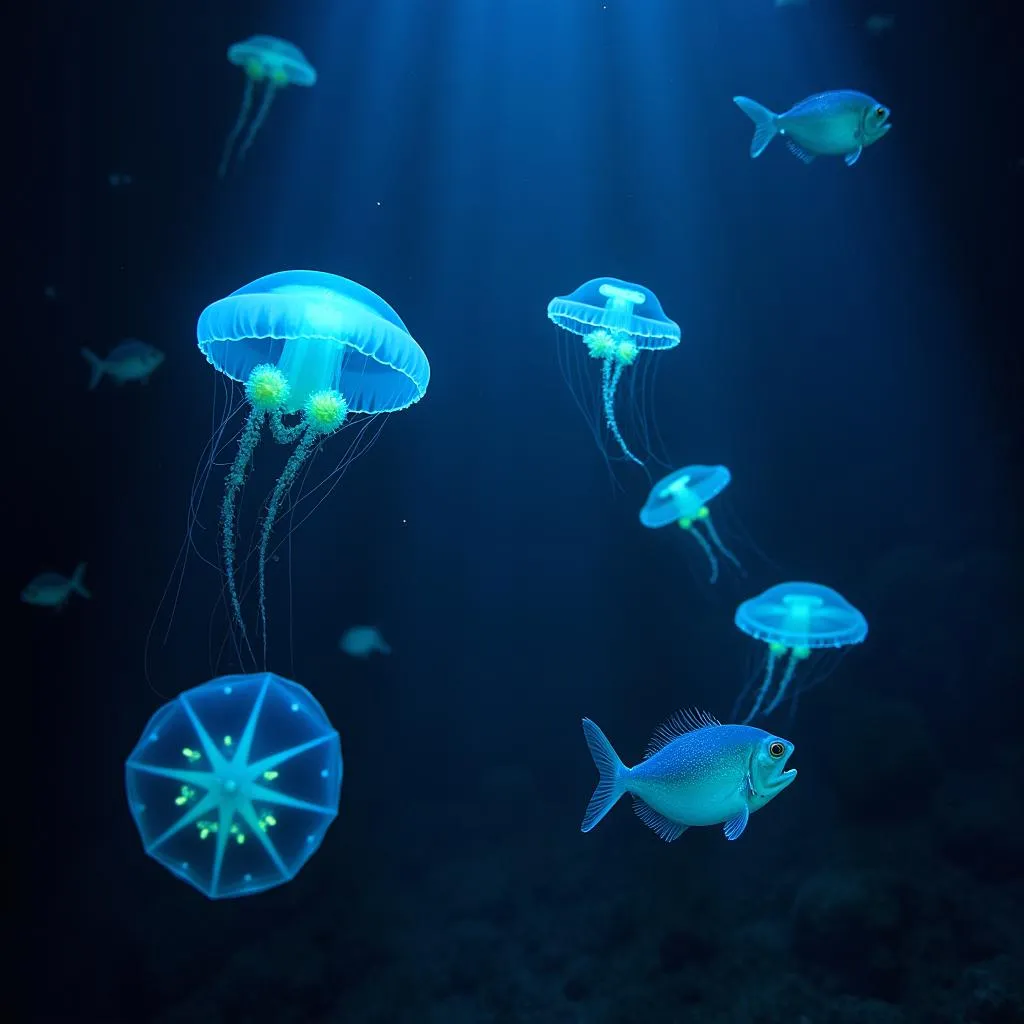The IELTS Speaking test often includes questions about nature and wildlife, with aquatic animals being a popular topic. This subject allows candidates to showcase their vocabulary, fluency, and ability to describe creatures in detail. Let’s explore how to effectively answer questions about an interesting aquatic animal, providing sample responses for different band scores.
Nội dung bài viết
Part 1: Introduction and Interview
In this section, the examiner may ask general questions about aquatic animals to warm you up. Here’s a sample question with suggested answers:
Examiner: Do you have a favorite sea animal?
Band 6-7 Answer:
“Yes, I do. I really like dolphins. They’re very intelligent and friendly animals. I’ve seen them in documentaries and they always seem to be smiling.”
Band 8-9 Answer:
“Absolutely. I’m particularly fascinated by octopuses. Their remarkable intelligence and problem-solving abilities never cease to amaze me. The way they can change color and texture to blend with their surroundings is truly extraordinary.”
 Octopus camouflaging in coral reef
Octopus camouflaging in coral reef
Part 2: Long Turn
Here’s a sample cue card related to describing an interesting aquatic animal:
Describe an aquatic animal you find interesting
You should say:
- What the animal is
- Where it lives
- What it looks like
- And explain why you find it interestingBand 6-7 Sample Answer:
“I’d like to talk about dolphins, which I find really interesting. Dolphins are marine mammals that live in oceans all around the world. They have a streamlined body shape with a rounded head and a long snout, which is often called a beak. Their skin is smooth and usually gray in color.
What makes dolphins interesting to me is their intelligence and social behavior. They’re known to be very smart animals and can even recognize themselves in mirrors. They live in groups called pods and communicate with each other using clicks and whistles. I’ve seen videos of dolphins helping humans and other animals, which I think is amazing.
Dolphins are also great swimmers and can jump high out of the water, which is always exciting to watch. They use echolocation to find food and navigate, which is like a natural sonar system. This ability fascinates me because it’s so different from how humans perceive the world.
Overall, I find dolphins interesting because of their friendly nature, high intelligence, and unique abilities. They seem to have a special connection with humans, and I hope to see them in the wild someday.”
Band 8-9 Sample Answer:
“I’d like to discuss the fascinating cephalopod known as the octopus, specifically the Pacific Giant Octopus. This remarkable creature inhabits the temperate waters of the North Pacific Ocean, from Japan to California, typically dwelling in rocky coastal areas at depths of up to 2,000 meters.
Physically, the Pacific Giant Octopus is a true marvel of nature. It boasts a bulbous head, eight arms lined with powerful suction cups, and a beak-like mouth. What’s truly astounding is its size – it can grow up to 5 meters in length and weigh over 70 kilograms, making it the largest octopus species.
The reasons I find this animal so captivating are manifold. Firstly, its intelligence is unparalleled among invertebrates. Octopuses have demonstrated problem-solving skills, tool use, and even the ability to open childproof bottles – a feat that challenges some humans! Their capacity for learning and memory is truly remarkable.
Secondly, their chameleonic ability to change color and texture is nothing short of extraordinary. Through a complex system of chromatophores, leucophores, and iridophores in their skin, they can instantaneously alter their appearance to blend seamlessly with their surroundings or communicate with other octopuses.
Furthermore, their unique physiology never ceases to amaze me. With three hearts, blue blood containing hemocyanin instead of hemoglobin, and a distributed nervous system where over half of their neurons are located in their arms, octopuses are a biological wonder.
Lastly, their short lifespan of 3-5 years, coupled with their solitary nature and the fact that they die shortly after breeding, adds a poignant element to their existence. It’s a reminder of the brevity and intensity of life in the natural world.
In conclusion, the Pacific Giant Octopus embodies the marvels of evolution and adaptation. Its intelligence, camouflage abilities, unique physiology, and lifecycle make it, in my opinion, one of the most fascinating creatures in our oceans.”
Describe a garden you have been to to practice describing outdoor environments, which can help you when discussing aquatic animal habitats.
Follow-up Questions:
Examiner: How do octopuses contribute to the marine ecosystem?
Band 6-7 Answer:
“Octopuses play an important role in the marine food chain. They eat various sea creatures like crabs and fish, which helps control their populations. At the same time, they’re food for larger animals like seals and sharks. This balance is crucial for a healthy ocean ecosystem.”
Band 8-9 Answer:
“Octopuses are integral to marine ecosystems in multiple ways. As opportunistic predators, they help regulate populations of various species, including crustaceans and mollusks, thus maintaining biodiversity. Their feeding habits can influence the structure of benthic communities. Moreover, octopuses serve as prey for larger marine animals, forming a crucial link in the oceanic food web. Their ability to adapt to changing environments also makes them important indicators of ecosystem health, particularly in the face of climate change and ocean acidification.”
Part 3: Two-way Discussion
Examiner: How do you think climate change is affecting marine life?
Band 6-7 Answer:
“Climate change is having a big impact on marine life. Rising sea temperatures are causing problems for many species. Coral reefs are dying, which affects the animals that depend on them. Some fish are moving to new areas to find cooler water. Polar animals like seals and penguins are losing their habitats as ice melts. It’s a serious problem that needs to be addressed.”
Band 8-9 Answer:
“Climate change is profoundly impacting marine ecosystems on multiple fronts. Ocean acidification, caused by increased absorption of CO2, is particularly detrimental to calcifying organisms like corals and shellfish, compromising their ability to form shells and skeletons. Rising sea temperatures are causing coral bleaching events with increasing frequency and severity, devastating reef ecosystems that are home to countless species.
Moreover, changing ocean currents and temperatures are altering the distribution of marine species, disrupting food webs and migration patterns. This can lead to mismatches between predators and prey, potentially causing population collapses. Sea level rise is threatening coastal habitats like mangroves and salt marshes, which are crucial nurseries for many marine species.
The melting of polar ice caps is particularly concerning for Arctic and Antarctic species, many of which are highly specialized and may struggle to adapt to rapidly changing conditions. This also opens up new shipping routes, potentially increasing pollution and the risk of oil spills in previously pristine areas.
These changes are not just ecological but have far-reaching socio-economic implications, affecting fisheries, coastal communities, and global food security. Addressing climate change and its impact on marine life requires a concerted global effort, combining mitigation strategies to reduce greenhouse gas emissions with adaptation measures to help marine ecosystems and dependent communities cope with the changes already underway.”
Describe a scenic spot in your country that might be home to interesting aquatic animals to expand your vocabulary for discussing natural habitats.
Key Vocabulary and Phrases for High Scores
-
Cephalopod /ˈsefələˌpɒd/ (noun): Any member of the molluscan class Cephalopoda, such as octopus or squid.
Example: “The octopus is a highly intelligent cephalopod known for its problem-solving abilities.” -
Chromatophore /krəˈmætəˌfɔːr/ (noun): A pigment-containing cell in the skin of animals, capable of changing size to vary skin color.
Example: “The octopus can rapidly change color thanks to its chromatophores.” -
Echolocation /ˌekəʊləʊˈkeɪʃn/ (noun): The location of objects by reflected sound, used by animals such as dolphins and bats.
Example: “Dolphins use echolocation to navigate and find food in murky waters.” -
Bioluminescence /ˌbaɪəʊluːmɪˈnesns/ (noun): The production and emission of light by living organisms.
Example: “The deep-sea anglerfish uses bioluminescence to attract prey in the darkness of the ocean depths.” -
Marine biodiversity /məˈriːn baɪəʊdaɪˈvɜːsɪti/ (noun phrase): The variety of life in the world’s oceans and seas.
Example: “Coral reefs are hotspots of marine biodiversity, hosting countless species in a complex ecosystem.”
 Bioluminescent marine organisms glowing in dark ocean
Bioluminescent marine organisms glowing in dark ocean
Examiner’s Advice
To achieve a high score in the IELTS Speaking test when describing an aquatic animal:
- Use a wide range of vocabulary, including specific terms related to marine biology and ecology.
- Demonstrate your ability to speak at length by providing detailed descriptions and explanations.
- Use complex sentence structures and idiomatic expressions naturally.
- Show critical thinking by discussing the animal’s role in the ecosystem and any conservation issues.
- Practice describing various aquatic animals to improve your fluency and confidence.
Remember, the key to success is not just knowing about the topic, but being able to communicate your knowledge effectively and fluently.
Describe a natural landscape in your country to further enhance your descriptive skills, which can be applied to discussing aquatic environments.


